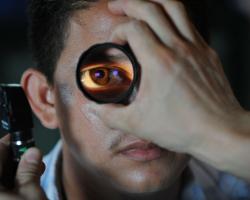A victim of home violence can go to a doctor with the request of receiving a medical certificate confirming their injuries and treatment. This certificate is not the equivalent of a forensic examination.
The certificate can be issued by any physician, while a forensic examination can only be conducted by a court-appointed physician. A forensic examination comes with a fee, unless it is ordered by the authority conducting criminal proceedings; the certificate is free of charge.
Certificate – free of charge from any physician
The Prevention of Domestic Violence Act amended in 2010 provides all victims of home violence with the right to a free-of-charge medical examination in order to establish the causes and types of bodily harm associated with violence. It has also introduced the option of issuing an injury certificate to the victim.
However, numerous physicians are still not aware of the fact that they should issue such a document at the request of the victim.
The certificate form and its content were set in the regulation of the Minister of Health. It should contain the opinion on the health of the patient, with specific identification of the type of the diagnosed bodily harm and the possible causes and dates of its creation.
What is also important, the scope of the certificate is limited to the description of the examination and a potential diagnosis of the possible causes of injuries – based on the patient’s testimony. The physician issuing the certificate cannot possess information on the cause of violence unless he or she is an eyewitness.
“The certificate can serve as evidence in scope of the establishment of injuries. However, it cannot serve as evidence in scope of the causes of said injuries; it can only be the evidence of the fact, that the patient has indicated such causes," explains Grzegorz Wrona, an attorney and consultant at the Specialist Family Outpatient Centre for the Prevention of Violence, and at the “Niebieska Linia" Domestic Violence Prevention Association.
The certificate and forensic examination issued by the physician can be presented in court or prosecution office as case evidence.
Differences between certificates and forensic examinations
Based on the certificate, a prosecuting attorney can file a motion for a forensic examination. However, it can only be conducted by a court-appointed physician.
The content of the forensic examination is more extensive than that of a certificate, e.g. it can contain a description of the injury-creation mechanism; establish the resulting duration of bodily harm, or of the impact on the operations of body organs.
Grzegorz Wrona reminds, “If a person willing to undergo a forensic examination arranges a private appointment with the court-appointed physician, he or she must take a fee into account. If the forensic examination is ordered as part of preparatory proceedings, the victim is not subject to any costs.
However, in many cases time between suffering an injury and the issue of the motion is long enough for the injuries to heal. This is why it is important to ask a physician for a certificate as soon as possible. The description contained within can serve as the foundation for the diagnosis made by the court-appointed physician.
A valid list of court-appointed physicians authorised to perform forensic examinations is available online and in all district courts.
More information on the role of physicians can be found in the system of domestic violence prevention on the website of the campaign entitled "Doctor, react to violence", established by the State Agency for the Prevention of Alcohol-Related Problems, at www.lekarzureagujnaprzemoc.pl.









Comments (0)